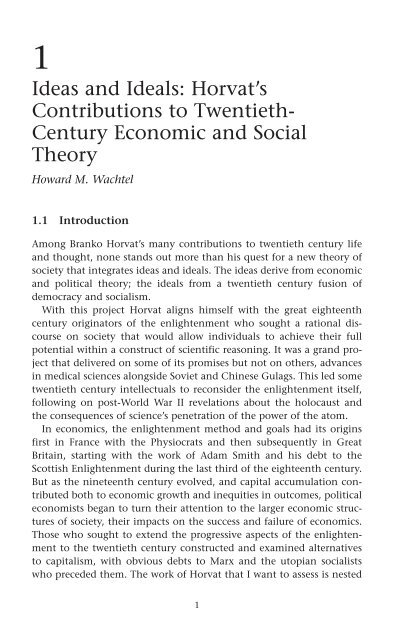Equality, Participation, Transition: Essays in Honour of Branko Horvat
Equality, Participation, Transition: Essays in Honour of Branko Horvat
Equality, Participation, Transition: Essays in Honour of Branko Horvat
You also want an ePaper? Increase the reach of your titles
YUMPU automatically turns print PDFs into web optimized ePapers that Google loves.
1<br />
Ideas and Ideals: <strong>Horvat</strong>’s<br />
Contributions to Twentieth-<br />
Century Economic and Social<br />
Theory<br />
Howard M. Wachtel<br />
1.1 Introduction<br />
Among <strong>Branko</strong> <strong>Horvat</strong>’s many contributions to twentieth century life<br />
and thought, none stands out more than his quest for a new theory <strong>of</strong><br />
society that <strong>in</strong>tegrates ideas and ideals. The ideas derive from economic<br />
and political theory; the ideals from a twentieth century fusion <strong>of</strong><br />
democracy and socialism.<br />
With this project <strong>Horvat</strong> aligns himself with the great eighteenth<br />
century orig<strong>in</strong>ators <strong>of</strong> the enlightenment who sought a rational discourse<br />
on society that would allow <strong>in</strong>dividuals to achieve their full<br />
potential with<strong>in</strong> a construct <strong>of</strong> scientific reason<strong>in</strong>g. It was a grand project<br />
that delivered on some <strong>of</strong> its promises but not on others, advances<br />
<strong>in</strong> medical sciences alongside Soviet and Ch<strong>in</strong>ese Gulags. This led some<br />
twentieth century <strong>in</strong>tellectuals to reconsider the enlightenment itself,<br />
follow<strong>in</strong>g on post-World War II revelations about the holocaust and<br />
the consequences <strong>of</strong> science’s penetration <strong>of</strong> the power <strong>of</strong> the atom.<br />
In economics, the enlightenment method and goals had its orig<strong>in</strong>s<br />
first <strong>in</strong> France with the Physiocrats and then subsequently <strong>in</strong> Great<br />
Brita<strong>in</strong>, start<strong>in</strong>g with the work <strong>of</strong> Adam Smith and his debt to the<br />
Scottish Enlightenment dur<strong>in</strong>g the last third <strong>of</strong> the eighteenth century.<br />
But as the n<strong>in</strong>eteenth century evolved, and capital accumulation contributed<br />
both to economic growth and <strong>in</strong>equities <strong>in</strong> outcomes, political<br />
economists began to turn their attention to the larger economic structures<br />
<strong>of</strong> society, their impacts on the success and failure <strong>of</strong> economics.<br />
Those who sought to extend the progressive aspects <strong>of</strong> the enlightenment<br />
to the twentieth century constructed and exam<strong>in</strong>ed alternatives<br />
to capitalism, with obvious debts to Marx and the utopian socialists<br />
who preceded them. The work <strong>of</strong> <strong>Horvat</strong> that I want to assess is nested<br />
1

















